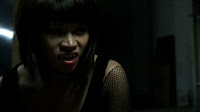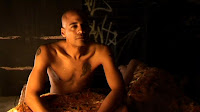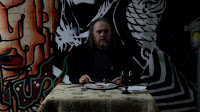Director: Bill Mousoulis
Release date: 2007
Contains spoilers
Before I get into the meat of my review of A Nocturne I must warn you that this is a film that has gained distribution on the Troma label. Not to warn you for the obvious reasons but to warn you because this is unlike any of the normal Troma fare, indeed there are going to be many-a-punter who pick this up expecting a standard Troma vampire movie and being bitterly disappointed.
Director Bill Mousoulis describes this as a philosophical vampire movie and, as I watched it, I was reminded – in tonal quality at least – of the Addiction. It was interesting to note therefore, as I read the press pack after viewing the movie, that Mousoulis saw A Nocturne in line with that film.
The film begins and ends with bookends. A quote from Nietzsche at both ends and a pianist (Magda Zappi) who plays Chopin’s Nocturne, Opus 27 #1. In many regards what we are to see is the quantative meaning of her recital via a Nietzschean exploration. As the camera shows us Melbourne and an industrial metal guitar thrashes across our senses we begin our journey. Mousoulis’ use of soundtrack in this is absolutely perfect, lifting us, carrying us, displaying the emotion of the film through the music – or lack of it.
A man, Z (Alex Spears), awakens. His bed is a mattress in a warehouse. Next to him is a woman, X (Vanessa de Largie). He whispers that it is “another f*cking day in Hell”. She sits by him, her movements loving until she cuts his neck and feeds. When she pulls back he goes to her neck and feeds also.
A Vietnamese family have dinner. The cousin (Ai Diem Le) makes conversation with the father (Van Anh Tran) about his wife being away – she has gone to Hanoi. The brother (Albert Fung) takes the last piece of food before Vee (Haiha Le) can get to it. Elsewhere a man, Seers (Patrick Boyle) awakens and his words, seemingly spoken to his dog, are poetry. We see Vee telling her father that she is going out to a dinner party. We see Seers walking his dog and then we see that his pain seems to stem from a woman, whose picture he keeps. We see X and Y cruising the streets, X barely able to contain the loathing she feels for the ordinary folk out in bars – a look of cold hatred crossing her face when she whispers her abhorrence at a woman in a bar.
Then, having met these participants, we discover that they know each other. Vee stands on the street, loitering by a car that has its hood up and talking into her mobile phone – she is not phoning for assistance, however, rather she is describing those who walk up the street. When it is a woman on her own (who was the woman in the bar that X whispered at), Z lunges out of the darkness of an alley and grabs her. Vee quickly puts the hood of the car down. As they drive to the warehouse, Seers complains that the woman doesn’t look right – he clearly is comparing her to the woman in the photo. The woman is laid out on the warehouse floor.
Vee, Z and X circle the woman as Seers offers a eulogy or incantation. As he speaks in poetry form the image of the photo superimposes over him. The three vampires become more and more excited, Vee’s fangs show and X and Z strip to feed. They attack first, Vee feeds next and finally the body is given to Seers. Having invoked his lost love into the victim, he butchers her and cooks her flesh – literally consuming his love. Seers is not a vampire, he is a cannibal. The fact that the woman was the same woman from the bar suggests that whilst X sees herself above the banality of the real world, she is actually reliant on it to provide sustenance.
As the night moves on we see that Vee was turned by Z, her remembrance of this is almost sexual for her. We also see other denizens of the night, the lost and the dispossessed. It becomes clear that these living symbols know each other, instinctively. However, things change for Z and X when they are visited by Rola (Jennifer levy). She speaks to them, at first in French and then in English and it becomes clear that on some level she made them – she describes them as her loathsome protégés. They had a grand experiment, a rebellion against the mundane where their vampirism was art, lifting them above the world and making them Übermensch. However she accuses their art of being an abomination and them of actually being products of the society they see themselves as above. Her speech unnerves the two and the film watches as their lives then unravel.
This is an astounding film. The performances by Alex Spears and Vanessa de Largie are superb – with little in the way of dialogue they (both novice actors when the film was made, it would seem) develop, through form and gesture, rounded and real characters. The role of Seers could quite easily have descended into pretension or unreal histrionics and yet Patrick Boyle makes the character all too believable and actual manages to illicit an audience sympathy for this cannibal poet. As well as the performances, the direction is superb. There are moments that are drawn around us that cause us to feel the characters' frustration, for instance, just in the way the scene was composed.
It is difficult to talk about the lore in this as Mousoulis uses genre staples as props in his story and thus we would stray into areas that are too spoiler heavy. The night-time existence is a choice, rather than a necessity. A stake is used but not in the way one would expect. The main genre staple that remains intact is blood drinking. The trouble, of course, is that many coming to the film will expect a horror story (and given the Troma label, a cheap-end one). What we get is an art film that uses the genre for its own ends and this will cause many who stumble into the film to dislike what they see. For me, however, Bill Mousoulis has made a wonderful piece of cinema.
The film will haunt you, stay with you and make your mind follow its ideas and meditations. It is a film that demands you watch it more than once and for me deserves no less than 8 out of 10. The imdb page is here.
On Demand @ Amazon US
On Demand @ Amazon UK
Sunday, June 06, 2010
Subscribe to:
Post Comments (Atom)

























3 comments:
I am not really one to leave a negative comment, but this time I just couldn't help myself.
Your reviews are often fantastic and always very thorough, and I find for the most part that I agree with a lot of your opinions on film, but this is one that I am going to adamantly disagree on. I apologize in advance if I offend you with this comment.
There is sometimes a fine line in film between being pretentious and profound. I found this to be the former. I also felt the film was trying to emulate the Addiction, but where the Addiction was successful,(to me at least) this film was an utter failure.
I vehemently disliked this film and probably for the same reasons I disliked Nadja (pretentious dribble) Habit (Indie film again trying far too hard to be interesting) and Vampyres (dull, dull, falling asleep, DULL!)
I'm all for symbolism and suggestion through music and visuals (even philosophical pondering is enjoyable when done right), but where some films do this with subtlety and skill (see Ganja & Hess) this film tried to ram it down the viewers throat.
All in all, this one seriously missed the mark for me.
Sorry to be so blunt.
Margaret, if we all liked the same films it would get very boring and I am not in the least offended.
You have your opinion on this and it is valid.
All the films you have mentioned in the comment are films I enjoyed - but that doesn't invalidate either of our opinions on them as they are just that. Nor does it mean that we won't agree on a good many too.
Thanks for being understanding of my perhaps overly emotional response to this film!
You are (of course) right. These are just our opinions and we are as likely to agree on as many as we disagree on.
I promise next time I will try and focus on the positive!
;)
Post a Comment